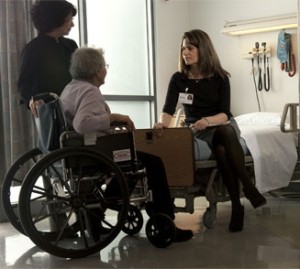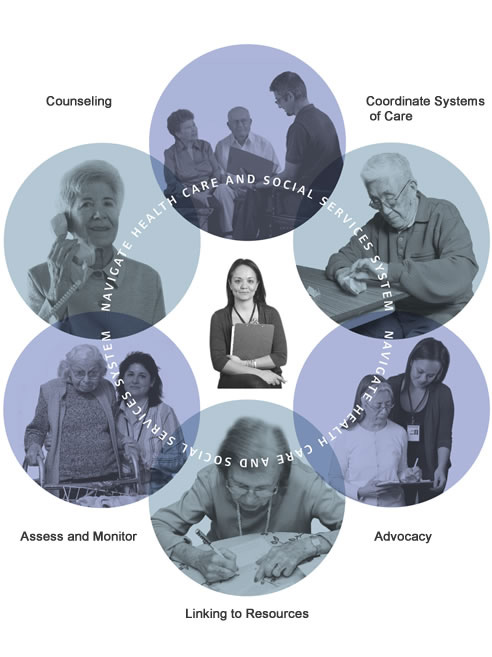 I have met Beatrice.
I have met Beatrice.
In fact, I have met a hundred Beatrices, because prior to joining the Hartford Foundation I worked directly with older adults as a geriatric social worker. Therefore, I can say with confidence that the story of 86-year-old Beatrice described throughout the 2009 Hartford Annual Report is a real one. Beatrice’s story documents the physical, psychological, and socioeconomic factors that affect the life of an older adult. Equally important, Beatrice’s story details the multiple and invaluable roles of geriatric social workers in maximizing the functioning and independence of aging Americans.
 Some of the endings of the other Beatrice stories that I know turned out happy and some sad, but the endings were rarely surprising. Two factors were key to increasing the likelihood of a happy ending: 1) the intervention of a dedicated social worker skilled in working with older adults, and 2) the coordination of care from all members of the health care team (including the Beatrices and their caregivers) across all settings of care.
Some of the endings of the other Beatrice stories that I know turned out happy and some sad, but the endings were rarely surprising. Two factors were key to increasing the likelihood of a happy ending: 1) the intervention of a dedicated social worker skilled in working with older adults, and 2) the coordination of care from all members of the health care team (including the Beatrices and their caregivers) across all settings of care.
Unfortunately, the chances of having both of these conditions met in our current health care system is next to nil. Your odds are better at the racetrack. Ultimately, the overwhelming frustration of seeing older adults suffer as a result of our fragmented, disorganized, and too often ageist health care system is what motivated me to stop waging these care coordination battles one older adult at a time and to join the staff of the Hartford Foundation where I could help make change on a national level.
Because of this, I am incredibly proud of the work of the Hartford Geriatric Social Work Initiative (GSWI).
Wearing my Hartford Foundation hat, I know the powerful outcomes of our social work projects, and I have been fortunate to work with the august leaders of the Hartford Geriatric Social Work Initiative. I have watched these leaders speak at national conferences to deans, directors, and social work faculty. I have seen them engage community partners to advocate on behalf of our aging society. I have seen them change the field of social work one person at a time by recruiting students who indicate even the slightest interest in aging.
It’s worth noting that I saw the real-world impact of Hartford social work projects in the field, well before I joined the Hartford team. I was a student in the classroom of the inspiring Barbara Berkman, Director of our Hartford Social Work Faculty Scholars program, with Hartford Doctoral Fellow and now Faculty Scholar Daniel Gardner as my TA. As a social work student with a concentration in aging, I benefited from an aging-focused curriculum and resources—much like those promoted through our Gero-Ed Center. During my clinical placement at the New York City Department for the Aging, I was exposed to the importance of research through projects like Hartford Faculty Scholar Patricia Brownell’s work on grandparent abuse. And after my schooling, I supervised a student in the Hartford-funded Practicum Partnership Program administered by the New York Academy of Medicine (now called HAPPAE). Here I learned the benefit of having a master’s-level social work student work in my adult day center for persons with dementia, who brought her training from another field placement at the Alzheimer’s Association to provide caregiver support for the loved ones of my dementia clients.
I know the GSWI is making a difference, because I saw--and continue to see--the results. GSWI has done much for many over the course of its 10 years.
But we celebrate this anniversary knowing full well that work remains. As noted throughout the annual report and this blog series, we need more social workers that know how to care for the unique needs of aging Americans. We also need health care professionals that recognize that they don’t work in a vacuum and that good health care is good team care that follows older adults across multiple transitions.
Beatrice--and all the Beatrices of the future--depend upon it.
Other blogs in this series
- Celebrating a Decade of Leadership in Geriatric Social Work by Nora OBrien-Suric
- Reaching Out to Social Work Leaders by Corinne Rieder
- Building the Student Pipeline by Nancy Kropf
- A Collaboration That’s Greater Than the Sum of Its Parts by Amy Berman
- Developing a Geriatrics-Trained Workforce by Tracy Schroepfer
